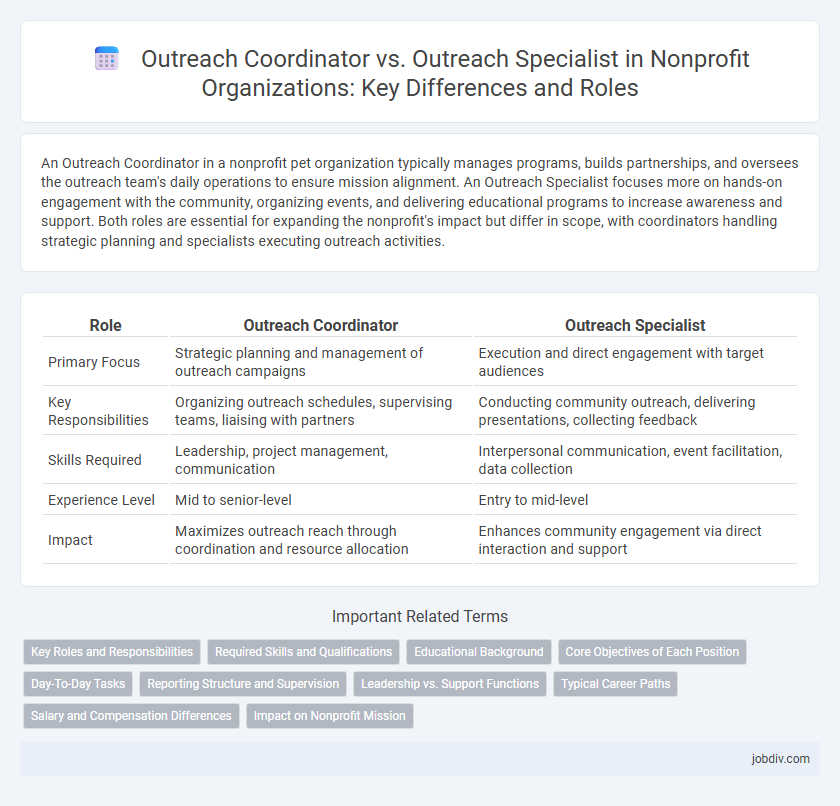An Outreach Coordinator in a nonprofit pet organization typically manages programs, builds partnerships, and oversees the outreach team's daily operations to ensure mission alignment. An Outreach Specialist focuses more on hands-on engagement with the community, organizing events, and delivering educational programs to increase awareness and support. Both roles are essential for expanding the nonprofit's impact but differ in scope, with coordinators handling strategic planning and specialists executing outreach activities.
Table of Comparison
| Role | Outreach Coordinator | Outreach Specialist |
|---|---|---|
| Primary Focus | Strategic planning and management of outreach campaigns | Execution and direct engagement with target audiences |
| Key Responsibilities | Organizing outreach schedules, supervising teams, liaising with partners | Conducting community outreach, delivering presentations, collecting feedback |
| Skills Required | Leadership, project management, communication | Interpersonal communication, event facilitation, data collection |
| Experience Level | Mid to senior-level | Entry to mid-level |
| Impact | Maximizes outreach reach through coordination and resource allocation | Enhances community engagement via direct interaction and support |
Key Roles and Responsibilities
An Outreach Coordinator manages community engagement strategies, oversees program implementation, and coordinates volunteer efforts to maximize nonprofit impact. An Outreach Specialist primarily focuses on building relationships with target audiences, delivering educational content, and facilitating communication between the organization and external stakeholders. Both roles are essential for driving effective outreach campaigns, but the coordinator typically handles planning and logistics while the specialist emphasizes direct interaction and outreach execution.
Required Skills and Qualifications
Outreach Coordinators typically require strong organizational skills, project management experience, and proficiency in communication to develop and implement outreach strategies effectively. Outreach Specialists focus more on specific expertise in community engagement, cultural competency, and relationship-building skills to connect with target populations and stakeholders. Both roles benefit from a background in public relations, social services, or nonprofit management, with coordinators often needing leadership abilities and specialists emphasizing direct interaction and program delivery skills.
Educational Background
Outreach Coordinators typically hold a bachelor's degree in fields such as social work, communications, or nonprofit management, emphasizing leadership and program development. Outreach Specialists often possess specialized training or certifications in community engagement, public relations, or education, focusing on targeted outreach strategies and client interaction. Both roles benefit from coursework in cultural competency, grant writing, and data analysis to effectively support community initiatives.
Core Objectives of Each Position
An Outreach Coordinator focuses on developing and managing community engagement strategies, organizing events, and coordinating volunteer efforts to enhance the nonprofit's visibility and impact. An Outreach Specialist centers on executing targeted outreach campaigns, building relationships with key stakeholders, and conducting data analysis to improve program effectiveness. Both roles aim to increase awareness and support, but the Coordinator emphasizes strategic planning while the Specialist prioritizes hands-on implementation and relationship management.
Day-To-Day Tasks
Outreach Coordinators manage and oversee community engagement programs, develop strategic plans, and coordinate volunteer activities to support nonprofit goals. Outreach Specialists focus on direct interaction with target audiences, conducting outreach events, delivering presentations, and gathering feedback to enhance program effectiveness. Both roles require strong communication skills, but Coordinators prioritize planning and administration, while Specialists emphasize hands-on community involvement.
Reporting Structure and Supervision
An Outreach Coordinator typically holds a supervisory role, managing Outreach Specialists and overseeing the execution of outreach strategies within a nonprofit organization. The Outreach Specialist reports directly to the Outreach Coordinator, focusing on implementing community engagement activities and gathering outreach data. This reporting structure ensures streamlined communication and effective monitoring of outreach goals and performance metrics.
Leadership vs. Support Functions
Outreach Coordinators typically assume leadership roles, managing outreach campaigns, setting strategic goals, and coordinating team efforts to maximize community engagement for nonprofits. Outreach Specialists focus on support functions, implementing outreach plans, conducting direct community interactions, and gathering data to inform program improvements. The Coordinator directs and oversees outreach projects, while the Specialist executes and supports activities to enhance nonprofit impact.
Typical Career Paths
Outreach Coordinators typically advance from entry-level outreach roles, gaining skills in project management, community engagement, and strategic planning, often progressing to program manager or director positions within nonprofits. Outreach Specialists usually start with focused responsibilities in communication or event coordination, developing expertise in stakeholder relations and advocacy, which can lead to senior specialist roles or transition into coordinator positions. Career growth in both roles benefits from experience in nonprofit operations, fundraising, and partnership development.
Salary and Compensation Differences
The salary for Outreach Coordinators typically ranges between $40,000 and $60,000 annually, reflecting their management responsibilities and strategic planning roles in nonprofit organizations. Outreach Specialists earn slightly less, with average salaries ranging from $35,000 to $50,000, due to their focus on executing outreach programs and direct community engagement. Compensation packages for Coordinators often include performance bonuses and leadership development opportunities, while Specialists may receive benefits geared towards skill-building and on-the-ground experience.
Impact on Nonprofit Mission
Outreach Coordinators strategically develop and manage community engagement initiatives, directly enhancing a nonprofit's mission by expanding its reach and fostering sustainable partnerships. Outreach Specialists implement targeted programs and communication efforts, increasing awareness and driving active participation among stakeholders. Together, they amplify a nonprofit's impact by ensuring effective connection with diverse audiences and resource mobilization.
Outreach Coordinator vs Outreach Specialist Infographic

 jobdiv.com
jobdiv.com